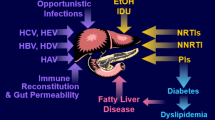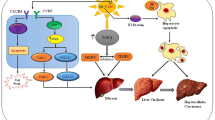Abstract
Hepatitis C virus (HCV) leads to disproportionate morbidity and mortality in the HIV-positive population. A new era of anti-HCV therapeutics is emerging, with many direct antiviral agents and immunomodulating drugs in clinical development. This review discusses HCV treatments in development, with special attention to four agents being studied actively among HIV/HCV-co-infected persons.
Similar content being viewed by others
References
Papers of particular interest, published recently, have been highlighted as: • Of importance
• Lo Re V 3rd, Kostman J, Amorosa VK: Management complexities in HIV/hepatitis C virus coinfection in the twenty-first century. Clin Liver Dis 2008, 12:587–609. This is a review of natural history, epidemiology, and clinical trials of HCV in HIV-positive persons.
Berenguer J, Crespo M, Galindo M, Tellez M, et al.: Sustained virological response to interferon plus ribavirin reduces HIV progression and liver-related mortality in patients co-infected with HIV and HCV. In Conference on Retroviruses and Opportunistic Infection. San Francisco, CA; 2010.
Wakita T, Pietschmann T, Kato T, Date T, et al.: Production of infectious hepatitis C virus in tissue culture from a cloned viral genome. Nat Med 2005, 11:791–796.
• Sarrazin C, Zeuzem, S: Resistance to direct antiviral agents in patients with hepatitis C virus infection. Gastroenterology 2010, 138:447–462. This is a review of specific resistance issues for the STAT-C agents.
Reesink HW, Zeuzem S, Weegink CJ, Forestier N, et al.: Rapid decline of viral RNA in hepatitis C patients treated with VX-950: a phase Ib, placebo-controlled, randomized study. Gastroenterology 2006, 131:997–1002.
Sarrazin C, Kieffer TL, Bartels D, Hanzelka B, et al.: Dynamic hepatitis C virus genotypic and phenotypic changes in patients treated with the protease inhibitor telaprevir. Gastroenterology 2007, 132:1767–1777.
Lu L, Pilot-Matias TJ, Stewart KD, et al.: Mutations conferring resistance to a potent hepatitis C virus serine protease inhibitor in vitro. Antimicrob Agents Chemother 2004, 48:2260–2266.
• McHutchison JG, Everson GT, Gordon SC, et al.; for the PROVE1 Study Team: Telaprevir with peginterferon and ribavirin for chronic HCV genotype 1 infection. N Engl J Med 2009, 360:1827–1838. This is a study of telaprevir for treatment of HCV GT-1 in treatment-naïve subjects.
• Hezode C, Forestier N, Dusheiko G, et al.; the PROVE2 Study Team: Telaprevir and peginterferon with or without ribavirin for chronic HCV infection. N Engl J Med 2009, 360:1839–1850. This is another study of telaprevir for treatment of HCV GT-1 in treatment-naïve subjects.
Everson GT, Dusheiko G, Ferenci P, et al.: Telaprevir, peginterferon alfa-2a and ribavirin improved rates of sustained virologic response (SVR) in “difficult-to-cure” patients with chronic hepatitis C (CHC): a pooled analysis from the PROVE1 and PROVE2 trials. In 60th Annual Meeting of the American Association for the Study of Liver Diseases. Boston, MA: 2009.
Benhamou Y, Moussalli J, Ratziu V, Lebray P, et al.: Results of a proof of concept study (C210) of telaprevir monotherapy and in combination with peginterferon alfa-2a and ribavirin in treatment-naive genotype 4 HCV patients. In EASL. Copenhagen: 2009.
Foster GR, Hezode C, Bronowicki JP, Carosi G, et al.: Activity of telaprevir alone or in combination with peginterferon alfa-2a and ribavirin in treatment-naïve genotype 2 and 3 hepatitis-C patients: final results of study C209. In EASL. Vienna: 2010.
McHutchison JG, Manns M, A Muir, et al.: PROVE 3 final results and 1-year durability of SVR with telaprevir-based regimen in hepatitis C genotype 1-infected patients with prior non-response, viral breakthrough or relapse to peginterferon-alfa-2a/b and ribavirin therapy. In 60th Annual Meeting of the American Association for the Study of Liver Diseases. Boston, MA: 2009.
Marcellin PXF, Goeser T, et al.: Virological analysis of patients receiving telaprevir administered q8h or q12h with peginterferon-Alfa-2a or -Alfa-2b and ribavirin in treatment-naïve patients with genotype 1 hepatitis C: Study C208. In 60th Annual Meeting of the American Association for the Study of Liver Diseases. Boston, MA; 2009.
Kwo PY, Lawitz E, McCone J, et al.: Response-guided therapy (RGT) for boceprevir (Boc) combination treatment? Results from HCV SPRINT-1. In Program and abstracts of the 60th Annual Meeting of the American Association for the Study of Liver Diseases. Boston, MA: 2009.
Zeuzem S: Heterogeneous virologic response rates to interferon-based therapy in patients with chronic hepatitis C: who responds less well? Ann Intern Med 2004, 140:370–381.
Schiff E, Poordad F, Jacobson I, Flamm S, et al.: Boceprevir (NS3 protease inhibitor) combination therapy in non-responders: phase II dose-finding study. In 43rd EASL. Milan, Italy: 2008.
Kwo P, Lawitz E, McCone J, Schiff E, et al.: HCV SPRINT-1 final results: SVR 24 from a phase 2 study of boceprevir plus pegintron (peginterferon alfa-2B)/ribavirin in treatment-naive subjects with genotype-1 chronic hepatitis C. In EASL. Copenhagen: 2009.
McHutchison JG, Lawitz E, Shiffman ML, Muir AJ, et al.; IDEAL Study Team: Peginterferon alfa-2b or alfa-2a with ribavirin for treatment of hepatitis C infection. N Engl J Med 2009, 361:580–593.
Haznedar J, Fretland J, Blotner S, Hill T, Tran JQ: Effects of multiple doses of ketoconazole on the pharmacokinetics of R7227(ITMN-191), a highly potent and selective inhibitor of the HCV NS3/4a protease. In 4th International Workshop on Clinical Pharmacology of Hepatitis Therapy. Boston, MA; 2009.
Kempf DJ, Klein C, Chen HJ, Klein LL, et al.: Pharmacokinetic enhancement of the hepatitis C virus protease inhibitors VX-950 and SCH 503034 by co-dosing with ritonavir. Antivir Chem Chemother 2007, 18:163–167.
Van Heeswijk R, Gysen V, Boogaerts G, et al.: The pharmacokinetic (PK) interaction between tenofovir disoproxil fumarate (TDF) and the investigational HCV protease inhibitor telaprevir (TVR). In 48th International Conference on Antimicrobial Agents and Chemotherapy. Washington, DC; 2008.
McMahon MA, Jilek BL, Brennan TP, Shen L, et al.: The HBV drug entecavir—effects on HIV-1 replication and resistance. N Engl J Med 2007, 356:2614–2621.
Lalezari J, Gane E, Rodriguez-Torres M, et al.: Inhibitor R7128 with Peg-IFN and ribavirin: interim results of R7128 500 mg BID for 28 days. In 43rd Annual Meeting of the European Association for the Study of the Liver. Milan, Italy; 2008.
Gane EJ, Nelson DE, Jacobson IM, et al.: Sustained virologic response (SVR) following RG7128 1500 MG BID/PEG-IFN/RBV for 28 days in HCV genotype 2/3 prior non-responders. In EASL. Vienna; 2010.
Bartosch B, Vitelli A, Granier C, Goujon C, et al.: Cell entry of hepatitis C virus requires a set of co-receptors that include the CD81 tetraspanin and the SR-B1 scavenger receptor. J Biol Chem 2003, 278:41624–41630.
Forestier N, Larrey D, Marcellin P, Benhamou Y, et al.: Antiviral activity and safety of ITMN-191 in combination with peginterferon alfa-2A and ribavirin in patients with chronic hepatitis C virus (HCV). In EASL. Copenhagen; 2009.
Gane EJ, Roberts S, Stedman CA, et al.: Combination therapy with a nucleoside polymerase (R7128) and protease (R7227/ITMN-191) inhibitor in HCV: safety, pharmacokinetics, and virologic results from INFORM-1. In 60th Annual Meeting of the American Association for the Study of Liver Diseases. Boston, MA; 2009.
Korba BE, Montero A, Farrar K, Gaye K, et al.: Nitazoxanide, tizoxanide and other thiazolides are potent inhibitors of hepatitis B virus and hepatitis C virus replication. Antivir Res 2008, 77:56–63.
• Elazar M, Liu M, McKenna SA, Liu P, et al.: The anti-hepatitis C agent nitazoxanide induces phosphorylation of eukaryotic initiation factor 2alpha via protein kinase activated by double-stranded RNA activation. Gastroenterology 2009, 137:1827–1835. This article elucidates the mechanism of action of NTZ against HCV.
Korba BE, Elazar M, Lui P, Rossignol JF, Glenn JS: Potential for hepatitis C virus resistance to nitazoxanide or tizoxanide. Antimicrob Agents Chemother 2008, 52:4069–4071.
Rossignol JF, Elfert A, El-Gohary Y, Keeffe EB: Improved virologic response in chronic hepatitis C genotype 4 treated with nitazoxanide, peginterferon, and ribavirin. Gastroenterology 2009, 136:856–862.
Rossignol JF, Elfert A, Keeffe EB: Treatment of chronic hepatitis C using a 4-week lead-in with nitazoxanide before peginterferon plus nitazoxanide. J Clin Gastroenterol 2009 Dec 31 (Epub ahead of print).
Bacon BR, Lim JK, Berman A, et al.; STEALTH C-3 Investigators. Phase 2 randomized, double-blind, placebo-controlled study of nitazoxanide plus peginterferon and ribavirin in HCV genotype 1 naïve patients: week 12 sustained virologic response rate. In EASL. Vienna; 2010.
Shiffman ML, Jacobson IM, Pruitt RE, Keeffe EB; STEALTH C-2 Investigators. Phase 2 randomized, double-blind, placebo-controlled study of nitazoxanide with peginterferon alfa-2A and ribavirin in nonresponders (NR) with chronic HCV genotype 1: final report. In EASL. Vienna; 2010.
Yoffe B, Gasitashvili K, Khaoustov V: Pilot study of lead-in nitazoxanide plus pegylated alpha-2a interferon and ribavirin in HCV-genotype 1 nonresponders with cirrhosis: interim results. In 60th Annual Meeting of the American Association for the Study of Liver Diseases. Boston, MA; 2009.
Rossignol JF: Nitazoxanide-based therapy for HCV genotype 4-infected patients. STEALTH C-1: phase II, randomized [abstract 178]. In AASLD. Boston, MA; 2007.
Keeffe E, Elfert A., Abousaif S, Rossignol JF: Controlled release nitazoxanide in combination with peginterferon alfa-2a plus ribavirin results in high early virologic response rates for treatment of chronic hepatitis C genotype 4. In AASLD. Boston, MA; 2009.
Inoue K, Umehara T, Ruegg UT, Yasui F, et al.: Evaluation of a cyclophilin inhibitor in hepatitis C virus-infected chimeric mice in vivo. Hepatology 2007, 45:921–928.
Flisiak R, Feinman SV, Jablkowski M, Horban A, et al.: The cyclophilin inhibitor Debio 025 combined with PEG IFNalpha2a significantly reduces viral load in treatment-naïve hepatitis C patients. Hepatology 2009, 49:1460–1468.
Flisiak R, Woynarowski M, Jablkowski M, Halota W, et al.: Efficacy of standard of care therapy following experimental Debio 025 treatment in patients with chronic hepatitis C. In EASL. Vienna; 2010.
Horban A, Berak H, Kolakowska-Rzadzka A, Patel H, et al.: Sustained virological response after 4-week treatment with Debio 025 monotherapy or coadministered with PEG-IFNα2A in HCV genotype 1 and 3 patients. In EASL. Vienna; 2010.
Flisiak R, Horban A, Gallay P, Bobardt M, et al.: The cyclophilin inhibitor Debio-025 shows potent anti-hepatitis C effect in patients coinfected with hepatitis C and human immunodeficiency virus. Hepatology 2008, 47:817–826.
Puyang X, Poulin P, Mathy JE, Anderson LJ, et al.: Mechanism of resistance of HCV replicons to structurally distinct cyclophilin inhibitors. Antimicrob Agents Chemother 2010, In press.
Acknowledgment
I would like to thank Marion Peters for her insights, edits, and suggestions.
Disclosure
No potential conflicts of interest relevant to this article were reported.
Author information
Authors and Affiliations
Corresponding author
Rights and permissions
About this article
Cite this article
Amorosa, V.K. New Frontiers of HCV Therapy in HIV/HCV Co-infection. Curr HIV/AIDS Rep 7, 117–126 (2010). https://doi.org/10.1007/s11904-010-0051-7
Published:
Issue Date:
DOI: https://doi.org/10.1007/s11904-010-0051-7




